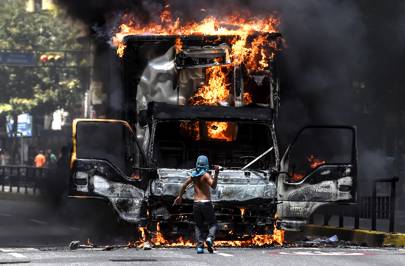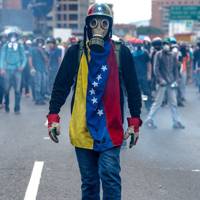ITS BACKED IN PART BY OIL PRODUCED BY A COMPANY THAT CANNOT PAY ITS DEBTS
IT IS YET TO BE SEEN IN CIRCULATION
BITCOIN CONTINUES TO BE ADOPTED
OIL IS NOW AT ITS WORST PRICE IN A DECADE
THIS IS AN EXTREME EXAMPLE OF THE FOLLY OF RELYING ON STABLE COINS WHERE A COIN IS BACKED BY SOMETHING CONSIDERED OF VALUE
TETHER IS ANOTHER EXAMPLE BACKED SUPPOSEDLY BY THE USD NO ONE KNOWS IF THEY ACTUALLY CAN COVER THE AMOUNT OF TETHER IN CIRCULATION AND HOW STRONG IS THE US CURRENCY DEBT WISE
Venezuela's cryptocurrency scam
Wednesday 22 August 2018A truck is set ablaze by protestors in the Venezuelan capital of Caracas in July 2017
JUAN BARRETO/AFP/Getty ImagesFor Jorge Farias, boss of Venezuelan startup Cryptobuyer, the Petro is personal. Anything in the crypto world is.
But it’s a special case with the Petro, the new cryptocurrency sanctioned by Venezuela’s government and designed to boost the bolivar, the country’s inflation-plagued national currency. International experts, however, have rather blunt words for the Petro: it’s a scam on top of another scam.
Farias, smartly dressed and with short stubble, launched Cryptobuyer three years ago, to help Latin Americans use cryptocurrencies to protect their salaries and savings. Cryptocurrencies may be highly volatile; bitcoin, for example, has plummeted from its peak value of $19,000 in January to around $6,000 now. For consumers in Venezuela, however, this probably counts as fairly stable, given the hyperinflation pushing their country close to the brink of economic collapse. Logically, then, launching a cryptocurrency like the state-created Petro is a clever move, right? Wrong.
The International Monetary Fund recently forecast that Venezuela’s economy will shrink about 18 per cent this year, while inflation is set to surge to one million per cent. Two months ago, the annual rate of inflation stood at 40,000 per cent. People are scared; more than 400,000 Venezuelans have already crossed the border into the neighbouring Ecuador, trying to escape their home’s crumbling economy. Brazil has also seen a surge in illegal immigration.
ByJoe Wallen
The government in Caracas, though, believes that it can get on top of the situation with some rather unusual economic measures. Cryptocurrency aside, the state relaunched its official paper-and-coins currency as the ‘sovereign bolivar,’ but only after devaluing the traditional bolívar by a whopping 95 per cent and then redenominating it, slashing five zeros from each banknote. For one US dollar, you’ll now get not 250,000 bolívars but about six million. The move is not without precedent: in 2008, former president Hugo Chavez replaced an earlier incarnation of the local currency with his Bolivar Fuerte, removing three zeros at the end.
“The same thing is happening again, but now with a smoke curtain saying they will be using blockchain technology and the Petro,” says Roger Benites, chief executive of BitInka, a crypto exchange based in Lima, Peru but operating in many Latin American countries (and until recently, in Venezuela, too).
A new cryptocurrency won't solve Venezuela's economic crisisCryptocurrencies
A new cryptocurrency won't solve Venezuela's economic crisis
The Petro was announced last December at the peak of the crypto bubble, emerging just when Venezuelans were trying to raise billions of dollars on the back of rather vague whitepapers outlining an Initial Coin Offering. The crypto world was bemused, but curious: this might be the first time that any government would issue its own digital money. “At least the Petro had some connection to the physical world. Compared to other things that were going on in crypto at the time, maybe it wasn't that absurd of a concept after all,” says Aaron Stanley from blockchain firm Sweetbridge.
Cryptocurrencies may be disruptive, but in the Venezuelan context, the Petro looks more like a folly. Venezuelans are crypto-savvy – they’ve been forced to become experts out of necessity, as they tried to survive in the midst of a crippled economy. For many months, Venezuelans have been putting their meagre savings into bitcoin, which allowed them to avoid the collapse of the bolivar.
Read next
Bitcoin mining in Venezuela is a dangerous trade, though, and has landed many in jail. Venezuela’s government subsidises electricity, so when miners use cryptocurrency to smuggle goods into the country, the government tracks and chases them by monitoring levels of electricity consumption. The outcome is either jail – or the need to pay a hefty bribe.
“And now the country is embracing cryptocurrency? Sounds like wonderland!” says Benites. He recalls how his company’s office in Venezuela was shut down, because, he says, it was a target for extortion by public employees and local law enforcement. “One of their high-ranked officials from the police intelligence agency was treating bitcoin miners as terrorists, and even came out saying miners where physically taking bitcoins to the border of Colombia to exchange them for US dollars. The national intelligence agency was saying there was a physical bitcoin! And now they have a national cryptocurrency – so who will mine it or sustain the network?”
One Petro is supposed to get you $60 or 3,600 sovereign bolívars. It’s supposedly backed by oil barrels produced by the national oil company PDVSA; the catch: PDVSA also has debts amounting to $45 billion. And in real life, the Petro – crypto or not – doesn’t exist at all. “We have not seen a single Petro circulating, nor its smart contracts, or rules of the token, and much less its blockchain,” says Farias.
In a way, introducing the Petro is a bit like a trick pulled by Germany’s government in the 1920s, when it invented the Rentenmark to end hyperinflation, and made it stable by backing it with a mortgage on all property used for agriculture and business. Back then, it worked, not least because property was something that Germans understood and could hold on to. This time, though, the situation “is just plain nonsense, backing up a fiat currency with a cryptocurrency tied to the barrels of oil from an entity that has an external debt they cannot pay,” says Benites.
And in contrast to Germany, the Petro is more of a fundraising stunt. Its ICO has already – allegedly – raised the equivalent of $3.3bn. “It may be a stunt, but a stunt that is working,” says Dickie Armour at ICO consultancy Corre Innovation. “The question is though – working for whom? President Nicholas Maduro and his cohorts? Or the people of Venezuela? Sadly, it’s more likely to be the former,” he sighs.
Read next
- Iceland's farmers have a cunning plan to solve crypto's energy crisis
Iceland's farmers have a cunning plan to solve crypto's energy crisis
BySean Williams and Peter Ward
Farias’ Cryptobuyer has been helping many Venezuelans from the start, offering customers gift cards for online stores like Amazon that can be paid with cryptocurrencies, allowing people to buy medicine, food and other supplies priced in dollars that would otherwise be inaccessible in a country where the government has been keeping tight tabs on currency exchange for over a decade. “We are about to issue our own token through an ICO,” says Farias. But unlike Petro, it will be “a functional, tangible product” with real and demonstrable uses. “The Petro to this day has shown to be neither one thing nor another, and is banned in the international market.”
Dangling the prospect of a new digital currency may give Venezuelans a false hope. Once the initial excitement is gone, they may quickly realise what the Petro really is – or isn’t. “The government is probably hoping that Venezuelans will think Petro is the same as bitcoin, but it isn’t,” says Gartner blockchain technology analyst, Avivah Litan. “Petro is a currency issued and controlled by the same incompetent, corrupt and opaque Venezuelan government that manages their fiat currency. People aren’t stupid, and they won’t buy it.”
It’s ironic, though, that cryptocurrency – an inherently volatile, unstable and still relatively new concept – is supposed to rescue a fiat currency. “You could say that desperate times with a starving population result in desperate action,” says Jonathan Fry from Team Blockchain. “What is any fiat currency but a promise to pay its debts or at least to pay the interest on its debts.” Cryptocurrencies are not all good, but they most definitely have a place and are a new asset class, no way to get around that, says Fry.
If the government had pegged the bolivar to bitcoin, things might pan out differently, because bitcoin is decentralised, so hackers won’t be able to take it over that easily. Most crypto fans also argue that the essence of digital money is about not having a central authority and a central bank. With bitcoin, because of the decentralisation, the state can’t take it away. With a fiat currency or Petro, it very much can.
If the Petro is nothing but a smoke screen, then why does it matter? Now that Caracas has formally launched the Petro, lawmakers in Iran and Russia are also be considering the benefits of creating their very own fiat cryptocurrency. “All of these countries have three traits in common: they are authoritarian (or deeply undemocratic), they have a lot of oil, and they are under sanctions,” says Alex Tapscott, co-founder of the Blockchain Research Institute. Venezuela is a case in point, showing how rogue governments could use their cryptocurrencies to undermine international law, treaties, and sanctions and further destabilise their already weak economies.
Except there is no way that it will ever work. The Petro is likely to go the same way as the Venezuelan economy itself. Fast.
Share this article
- Forums
- International Markets
- VENEZUALAS CRYPTO SCAM
ITS BACKED IN PART BY OIL PRODUCED BY A COMPANY THAT CANNOT PAY...
-
- There are more pages in this discussion • 1 more message in this thread...
You’re viewing a single post only. To view the entire thread just sign in or Join Now (FREE)








